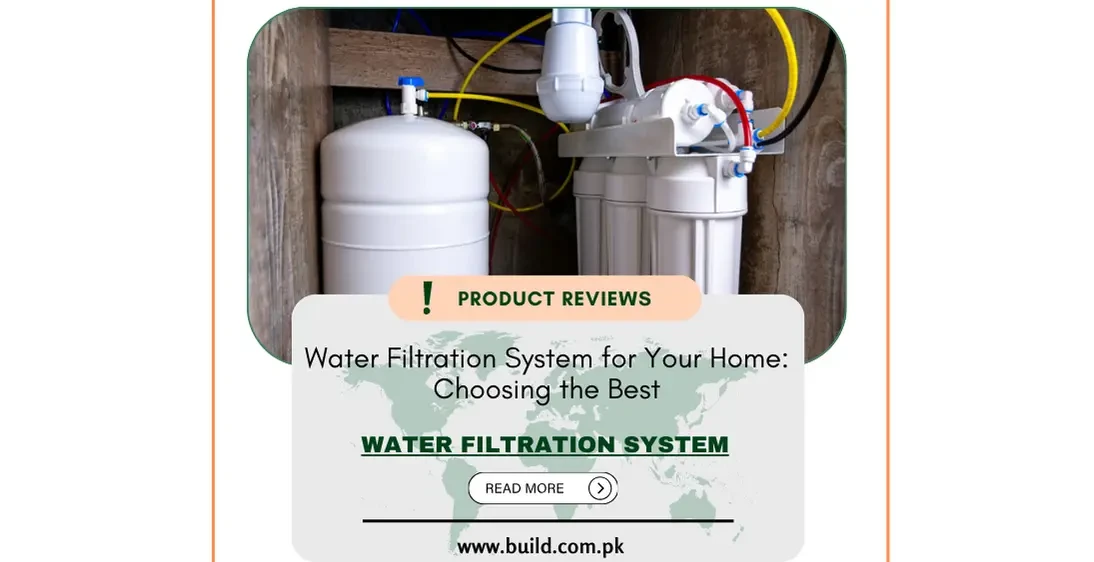Water Filtration System for Your Home: Choosing the Best

Introduction:
Ensuring access to clean and safe drinking water is essential
for maintaining good health and well-being. With various water filtration
systems available on the market, finding the best one for your home can be
daunting. In this comprehensive guide, we'll explore different types of water
filtration systems, factors to consider when choosing one, and our top
recommendations to help you make an informed decision.
Importance of Water Filtration Systems:
Clean and safe drinking water is crucial for hydration,
cooking, and overall health. Tap water can contain impurities such as
chemicals, heavy metals, bacteria, and contaminants that may affect taste and
pose health risks when consumed regularly. A high-quality water filtration
system can effectively remove these impurities, providing you and your family
with clean, great-tasting water that promotes health and well-being.

Types of Water Filtration Systems
There are several types of water filtration systems
available, each with unique features and capabilities:
Activated Carbon Filters:
How They Work: Activated carbon filters use porous carbon to
trap impurities and contaminants, such as chlorine, volatile organic compounds
(VOCs), and certain chemicals commonly found in tap water.
Advantages: Improve the taste and odor of water by removing
chlorine and organic compounds. They are relatively affordable, easy to
install, and do not require electricity.
Considerations: While effective at improving water taste, activated carbon filters may not remove minerals, salts, or microbes from water.
Reverse Osmosis (RO) Systems:
How They Work: RO systems use a semipermeable membrane to
remove a wide range of impurities, including dissolved solids, heavy metals
(such as lead and arsenic), bacteria, and viruses.
Advantages: Highly effective at removing contaminants,
producing clean and pure drinking water. Ideal for areas with poor water
quality or specific health concerns.
Considerations: RO systems may produce wastewater during
filtration and require regular maintenance, including membrane replacement.
UV Water Purifiers:
How They Work: UV water purifiers use ultraviolet light to
disinfect water by destroying the DNA of bacteria, viruses, and other microbes,
rendering them harmless.
Advantages: Chemical-free water purification method that
effectively kills harmful pathogens.
Considerations: UV purifiers do not remove non-biological
contaminants or improve water taste. They require electricity to operate.
Water Distillation Systems:
How They Work: Water distillation systems heat water to
create steam, which is then condensed back into liquid form, leaving behind
impurities such as minerals, chemicals, and heavy metals.
Advantages: Removes most contaminants from water, including
heavy metals and chemicals.
Considerations: Energy-intensive process that may require
additional mineralization to improve water taste.
Gravity Water Filters:
How They Work: Gravity water filters use a combination of
ceramic, carbon, and other media to remove contaminants as water passes through
the filter by gravity.
Advantages: No electricity required, making them suitable for
outdoor use or emergencies. Effective at removing sediments and certain
contaminants.
Considerations: Filter lifespan and effectiveness may vary
based on water quality and usage.
Factors to Consider When Choosing a Water Filtration System
Before selecting a water filtration system for your home,
consider the following factors:
- Water Quality: Identify specific contaminants in your water supply through water testing to determine which filtration method is most suitable for your needs.
- Installation and Maintenance: Evaluate installation requirements and ongoing maintenance tasks, such as filter replacement intervals and costs.
- Budget: Set a budget that includes the initial purchase price, installation costs (if applicable), and ongoing maintenance expenses.
- Flow Rate and Capacity: Consider the system's flow rate (gallons per minute) and capacity to ensure it meets your household's water usage needs without compromising performance.
- Certifications: Look for products certified by reputable
organizations such as NSF International or the Water Quality Association (WQA)
to ensure effectiveness and safety.
Top Recommendations: Best Water Filtration Systems for Home Use
Based on the above considerations, here are our detailed
recommendations for water filtration systems:
Aquasana 3-Stage Under Sink Water Filter:
Features: Uses a combination of activated carbon, catalytic
carbon, and ion-exchange to effectively remove contaminants and improve water
taste.
Benefits: Provides clean, great-tasting water directly from
your kitchen sink. Reduces chlorine, lead, mercury, and other harmful
substances.
APEC Water Systems Water Filter System:
Features: 5-stage filtration process including sediment,
carbon, and RO membrane to remove up to 99% of contaminants, including fluoride
and heavy metals.
Benefits: Produces high-quality drinking water that is free
from impurities and suitable for cooking and drinking.
Berkey Gravity Water Filter System:
Features: Gravity-fed water filtration system with ceramic
filters and carbon elements. Removes pathogens, sediment, and certain chemicals
without requiring electricity.
Benefits: Ideal for emergencies or outdoor use. Provides
clean and safe drinking water without the need for electricity or plumbing.
iSpring Whole House Water Filtration System:
Features: Multi-stage filtration system for whole house water
treatment, including sediment and carbon filters to improve water quality
throughout your home.
Benefits: Reduces sediment, chlorine, and other contaminants
in all water sources, ensuring clean and safe water for drinking, bathing, and
cooking.
Conclusion:
Choosing the best water filtration system for your home depends on your specific water quality concerns, budget, and household needs. Consider the detailed information provided in this guide and explore our top recommendations to find a water filtration solution that ensures clean, safe, and great-tasting water for you and your family. Invest in a quality water filtration system today to enjoy the benefits of pure and healthy drinking water at home. If you have any questions or need further assistance, consult with a water treatment professional for personalized recommendations tailored to your unique circumstances. Remember, access to clean water is essential for maintaining good health and well-being. Choose wisely and prioritize the health and safety of your family with a reliable water filtration system









